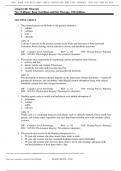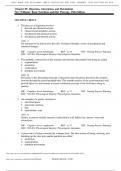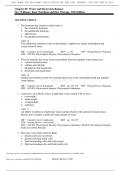All 5 results
Sort by
Best selling Williams\' Basic Nutrition & Diet Therapy14 notes

-
Chapter 08: Minerals Nix: Williams' Basic Nutrition and Diet Therapy, 15th Edition
- Exam (elaborations) • 8 pages • 2024 Popular
- Available in package deal
-
 Smartdove
Smartdove
-
- $17.99
- + learn more
1. The mineral present in the body in the greatest amount is a. sodium. b. calcium. c. iron. d. chloride. ANS: B Calcium is present in the greatest amount in the body and functions in bone and teeth formation, blood clotting, muscle and nerve action, and metabolic reactions. DIF: Cognitive Level: Knowledge REF: p. 110 TOP: Nursing Process: Planning MSC: NCLEX: Physiological Integrity: Physiological Adaptation 2. The factors most responsible for regulating calcium absorption from food ...

-
Chapter 05: Digestion, Absorption, and Metabolism Nix: Williams' Basic Nutrition and Diet Therapy, 15th Edition
- Exam (elaborations) • 8 pages • 2024 Popular
- Available in package deal
-
 Smartdove
Smartdove
-
- $16.49
- + learn more
1. The process of digestion involves a. thermal and chemical actions. b. chemical and metabolic actions. c. mechanical and chemical actions. d. mechanical and thermal actions. ANS: C For nutrients to be delivered to the cells, food goes through a series of mechanical and chemical changes. DIF: Cognitive Level: Knowledge REF: p. 56 TOP: Nursing Process: Planning MSC: NCLEX: Physiological Integrity: Physiological Adaptation 2. The rhythmic contractions of the stomach and intestine that ...

-
Chapter 09: Water and Electrolyte Balance Nix: Williams' Basic Nutrition and Diet Therapy, 15th Edition
- Exam (elaborations) • 9 pages • 2024 Popular
- Available in package deal
-
 Smartdove
Smartdove
-
- $18.99
- + learn more
1. The hormone that conserves body water is a. the vitamin D hormone. b. the antidiuretic hormone. c. aldosterone. d. the parathyroid hormone. ANS: B The antidiuretic hormone works on the kidneys’ nephrons to induce reabsorption and conservation of water. DIF: Cognitive Level: Knowledge REF: p. 143 TOP: Nursing Process: Planning MSC: NCLEX: Physiological Integrity: Physiological Adaptation 2. The two minerals that occur in the extracellular fluid and regulate water balance are a. c...
Do you also write study notes yourself? Put them up for sale and earn every time your document is purchased.
Newest Williams\' Basic Nutrition & Diet Therapy14 summaries

-
Chapter 01: Food, Nutrition, and Health Nix: Williams Basic Nutrition and Diet Therapy, 15th Edition 2024
- Package deal • 9 items • 2024 New
-
 Smartdove
Smartdove
-
- $20.49
- + learn more
Chapter 01: Food, Nutrition, and Health Nix: Williams Basic Nutrition and Diet Therapy, 15th Edition Chapter 02: Carbohydrates Nix: Williams Basic Nutrition and Diet Therapy, 15th Edition Chapter 05: Digestion, Absorption, and Metabolism Nix: Williams Basic Nutrition and Diet Therapy, 15th Edition

-
Chapter 09: Water and Electrolyte Balance Nix: Williams' Basic Nutrition and Diet Therapy, 15th Edition
- Exam (elaborations) • 9 pages • 2024 New
- Available in package deal
-
 Smartdove
Smartdove
-
- $18.99
- + learn more
1. The hormone that conserves body water is a. the vitamin D hormone. b. the antidiuretic hormone. c. aldosterone. d. the parathyroid hormone. ANS: B The antidiuretic hormone works on the kidneys’ nephrons to induce reabsorption and conservation of water. DIF: Cognitive Level: Knowledge REF: p. 143 TOP: Nursing Process: Planning MSC: NCLEX: Physiological Integrity: Physiological Adaptation 2. The two minerals that occur in the extracellular fluid and regulate water balance are a. c...

-
Chapter 08: Minerals Nix: Williams' Basic Nutrition and Diet Therapy, 15th Edition
- Exam (elaborations) • 8 pages • 2024 New
- Available in package deal
-
 Smartdove
Smartdove
-
- $17.99
- + learn more
1. The mineral present in the body in the greatest amount is a. sodium. b. calcium. c. iron. d. chloride. ANS: B Calcium is present in the greatest amount in the body and functions in bone and teeth formation, blood clotting, muscle and nerve action, and metabolic reactions. DIF: Cognitive Level: Knowledge REF: p. 110 TOP: Nursing Process: Planning MSC: NCLEX: Physiological Integrity: Physiological Adaptation 2. The factors most responsible for regulating calcium absorption from food ...
Do you also write study notes yourself? Put them up for sale and earn every time your document is purchased.

-
Chapter 05: Digestion, Absorption, and Metabolism Nix: Williams' Basic Nutrition and Diet Therapy, 15th Edition
- Exam (elaborations) • 8 pages • 2024 New
- Available in package deal
-
 Smartdove
Smartdove
-
- $16.49
- + learn more
1. The process of digestion involves a. thermal and chemical actions. b. chemical and metabolic actions. c. mechanical and chemical actions. d. mechanical and thermal actions. ANS: C For nutrients to be delivered to the cells, food goes through a series of mechanical and chemical changes. DIF: Cognitive Level: Knowledge REF: p. 56 TOP: Nursing Process: Planning MSC: NCLEX: Physiological Integrity: Physiological Adaptation 2. The rhythmic contractions of the stomach and intestine that ...

Do you wonder why so many students wear nice clothes, have money to spare and enjoy tons of free time? Well, they sell on Stuvia! Imagine your study notes being downloaded a dozen times for $15 each. Every. Single. Day. Discover all about earning on Stuvia
